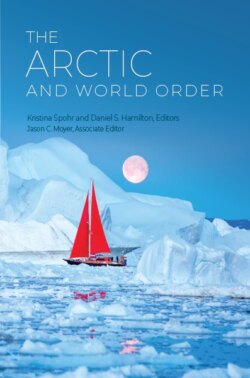Читать книгу The Arctic and World Order - Группа авторов - Страница 6
На сайте Литреса книга снята с продажи.
Introduction From Last Frontier to First Frontier: The Arctic and World Order
ОглавлениеKristina Spohr and Daniel S. Hamilton
As goes the Arctic, so goes the world.
—Inuk leader Sheila-Watt Cloutier1
The Arctic has been described as the world’s “last frontier”—the final place on earth where states have staked claims to untapped territories, maritime boundaries, and natural resources. It was called the “last white dot on the map” because for centuries it was remote, inaccessible, largely untouched and of little overarching importance to global affairs. The Arctic was last then because so little was at stake.2
Today, however, the Arctic may become our first frontier—the first place on earth where state and non-state actors are being driven to devise new governance approaches for a world of more diffuse power, sharper geopolitical competition, and deepening interdependencies between nature and humanity. The Arctic is now often the first, not the last, space that comes to mind when one thinks of climate change, resource exploitation, and novel global connections. Attributes of what may prove to be a new world order could begin to take shape there. The Arctic is now first because so much is at stake.3
A space of often-bitter cold, the Arctic is the fastest-warming place on earth.4 As the region’s ice-scape becomes a sea-scape, some see geophysical calamity. Others glimpse new economic vistas. Across one of the bleakest and most fragile landscapes in the world, the race is on for gas, oil, minerals and fish and to control the emerging shipping routes of the High North. As a consequence, the Arctic is becoming the front line between geo-economic competition and environmental degradation.
What happens in the Arctic doesn’t stay in the Arctic. Because the region is at the forefront of climate change, it is the world’s climate “messenger.”5 The accelerating loss of Arctic sea ice, the collapse of the Greenland ice-sheet, the greening of the Arctic, and disruptive changes to the planet’s thermohaline system have potentially significant consequences for the world’s weather, marine ecosystems, coastal water quality and nutrient cycling, the trajectory and force of the Gulf Stream and the North Atlantic Current, the relative accessibility of mineral and biological riches, and the lives and livelihoods of both local communities and those far away. Changes in the Arctic could affect threatened and endangered species and could result in migration of fish stocks to new waters. Moreover, Arctic changes are not only affecting climate all around the world, those changes are rippling back to further worsen the Arctic climate.6
The Arctic’s frontier status reflects, of course, the simple fact that nobody owns it. Unlike Antarctica—regulated since 1959 by the Antarctic Treaty, which established the continent as a scientific preserve and banned military activity—the polar region of the north, specifically the Central Arctic Ocean, is one of the least governed places on earth. There are more rules even in outer space.7 That has led to tensions and disputes, but has also helped to generate innovative approaches to unconventional challenges that could offer lessons for other regions.
Traditionally, the Arctic has been a region where some big powers act small and some small powers act big. Norway, for example, has been an Arctic Big Power. So too has Canada, a country of great geographic expanse but modest global influence. The United States, in contrast, is a global superpower that traditionally has acted as an Arctic Small Power: the region has rarely gained priority attention in Washington. As the Arctic opens up, these roles are all in flux as Arctic and non-Arctic states all jockey for position. As great power competition intensifies, the region is becoming a testing ground for the world’s new geopolitics. Great power rivalry risks transforming the Arctic from a region of cooperation and low tensions to one of contention and rising tensions. The Arctic could present a litmus test not just for humanity’s fight to safeguard planetary health but also of how ongoing shifts in world order play out.8
